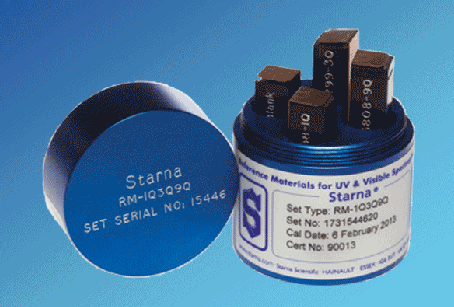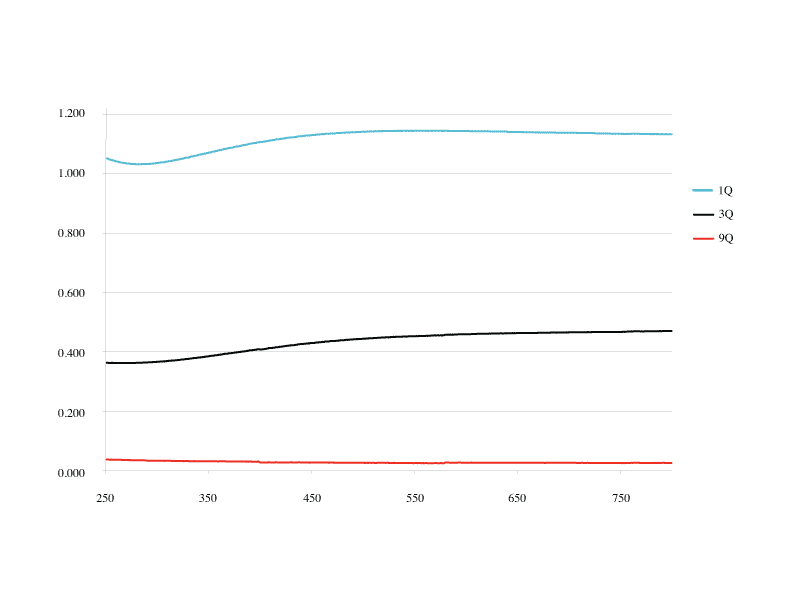
For assessing the UV/Visible absorbance scale of your spectrophotometer

| Description | Metal on Quartz filter for absorbance and linearity in the UV/Vis region |
|---|---|
| Primary Usage | Validate the UV/Visible absorbance scale of spectrophotometers |
| Useable Range | 250nm to 635nm, spectral bandpass of 5nm or less |
| Certified Wavelengths | 250, 280, 340, 360, 400, 465, 500, 546.1, 590 and 635 nm at Spectral Band Width of 5 nm or less |
| Physical Configuration | Metal coated quartz filter with coated side protected by a quartz window optically contacted. The filters are mounted in protective aluminum holders that will fit a standard instrument cell holder. |
| NIST Traceability | Each set is supplied with a Calibration Certificate of Analysis, which clearly defines the NIST Traceability |
| ISO Accredited | ISO/IEC 17025, ISO Guide 34 by UKAS. ISO 9001 by BSI |
Product Description
View/Download Comprehensive Data Sheet for Metal-on-Quartz Reference
The Starna RM-1Q3Q9Q is a direct equivalent to the NIST SRM 2031, with a standard range of metal on quartz transmission / absorbance standards for the UV/Visible area of the spectrum.
All Starna Metal on Quartz filters have an optically bonded quartz cover plate to protect the metalised surface and facilitate easy cleaning. This was also a feature of the original NIST SRM 2031.
The filters allow absorbance / transmission and linearity at the ten wavelengths across the range and the relative values are shown on the table below. They can be certified at other wavelengths on request. The filters are produced in our ISO 9001 accredited production facility under ISO Guide 34 as a reference material producer and calibrated in our ISO/IEC 17025 accredited Calibration Laboratory.
Catalog No. |
Transmission |
Absorbance |
|---|---|---|
| Q1 | 1% | 2.00 A |
| Q3 | 3% | 1.52 A |
| 1Q | 10% | 1.00 A |
| 3Q | 30% | 0.52 A |
| 5Q | 50% | 0.30 A |
| 9Q | 90% | 0.06 A |
Suggestions for Use
The UV/Visible Metal on Quartz filters have a relatively flat transmission profile across all UV/Visible wavelengths. Normally, three representative absorption filters would be chosen for any given application but the filters may be bought individually, in sets as shown below or any combination from the standard range.
It is important to confirm that Metal on Quartz filters are suitable for use with your instrument as they have a highly reflective surface and some instruments are sensitive to back reflection within the sample compartment.
Scan of RM-1Q3Q9Q

Interpertation of Results
Consult your spectrophotometer's reference manual for the specification of your instrument's absorbance scale tolerance. This figure will be listed as a plus and minus (+/-) number in absorbance units. Add your instrument's absorbance tolerance to the confidence limit on the certificate supplied with the Metal on Quartz set for your expected absorbance range. Compare the absorbance values measured on your instrument with the expected values calculated from your instrument manual and the NIST traceable certificate. If the readings are within the expected range for your instrument then your absorbance scale is correct. If not, consult your service techincian and have the instrument evaluated. Quite often if the results of your absorbance measurments are low, it shows that your lamp needs to be replaced.
Quality program
Each time that the analysis is repeated you can compare the new results with the previous results to check for any variance. If your instrument needs service because of a change in absorbance, the historical data will greatly assist the service technician.
How to Order
Catalog Number |
Description |
|---|---|
| RM-Q1 | Metal on Quartz Reference, 1% plus blank |
| RM-Q3 | Metal on Quartz Reference, 3% plus blank |
| RM-1Q | Metal on Quartz Reference, 10% plus blank |
| RM-3Q | Metal on Quartz Reference, 30% plus blank |
| RM-5Q | Metal on Quartz Reference, 50% plus blank |
| RM-9Q | Metal on Quartz Reference, 90% plus blank |
| RM-Q35Q | Metal on Quartz Reference, 3%, 50%, blank |
| RM-1Q3Q9Q | Metal on Quartz Reference, 10%, 30%, 90%, blank |
Download MSDS Sheet for Metal on Quartz Reference